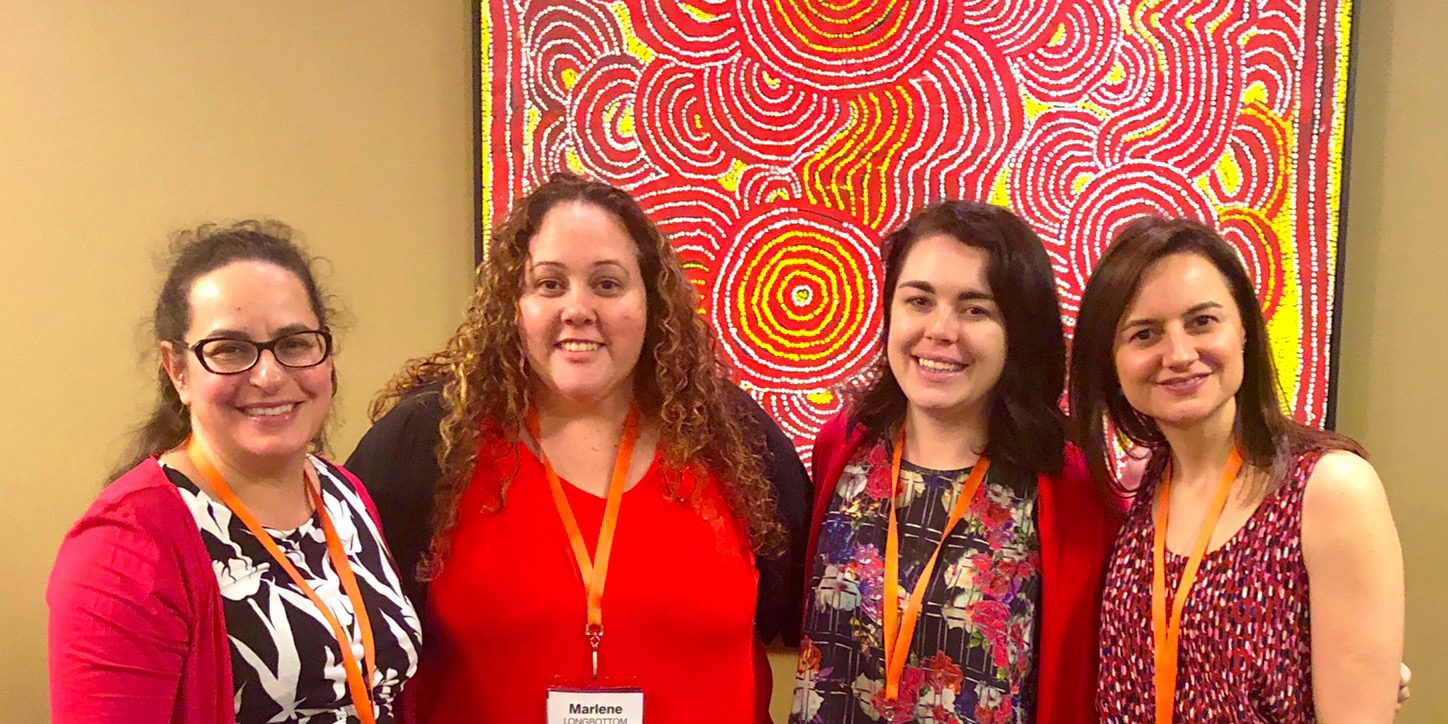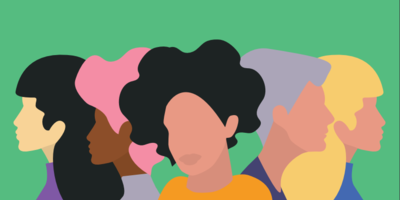
Working together, using health systems to eliminate violence against women
[Image (Left to Right): Tamara Mackean, Marlene Longbottom (UOW), Keziah Bennett-Brook, Patricia Cullen.]
A profile piece with Tamara Mackean and Patricia Cullen for International Day for the Elimination of Violence against Women 2018
Q: What compels you to work together towards eliminating violence against women?
As a collective of researchers, we bring together personal, professional, family and community experiences that have compelled us to work in this space. We see this as a major issue in Australia and globally, and want to use our skills and position as researchers to build the evidence and drive a coordinated response to address violence against women and girls.
We connected through working on projects in the Injury research division at The George Institute and discovered a shared interest in the safety and well-being of women and children. This ultimately led to the development of several projects, partnerships, and collaborations that we are continuing to grow. Our research has a strong focus on Aboriginal and Torres Strait Islander women and their families, and as such we have engaged with Aboriginal and Torres Strait Islander researchers and community controlled organizations.
Early on, we connected with Dr Marlene Longbottom, Research Fellow at the University of Wollongong, whose research explores the experiences and systemic responses to Aboriginal women who are survivors of violence, which helped to inform the First Response project. Together, we are working collaboratively with Aboriginal Community Controlled Health Organisations in four communities in New South Wales.
Our research is underpinned by robust decolonizing methodologies that are culturally safe and prioritize translation at the community, service delivery, and policy levels. This has been supported by Keziah Bennett-Brook, Manager of Aboriginal and Torres Strait Islander Health program at The George Institute, who has worked closely with us at all stages of the projects.
Q: What is the role of the health sector in addressing violence against women?
The health sector has a significant role to play in reducing violence against women, which includes actions in health promotion, ensuring access to assistance, competent practitioners/providers, supportive services and enabling policy frameworks. In relation to health promotion, it is vital that people in communities are aware of what violence against women entails – physical violence, sexual violence, emotional violence, social violence – and how it can be recognized.
In communities, people need to know where they can turn to for help and safety, including women experiencing violence. For Aboriginal and Torres Strait Islander women, there is a fraught history of racism, discrimination, and ongoing systemic issues that prevent women from seeking support, both in the health and justice sectors. In acknowledgment of this, community and health services must be accessible to Aboriginal and Torres Strait Islander women and have practitioners who are trained in culturally safe trauma-informed care.
Services also need to facilitate cross-agency work where both health and social needs can be properly assessed and responded to ensure safety and crisis care. All of these processes must be supported by appropriate policies that enable cross-sectoral collaborations and resource allocation.
Q: Tell us about your work to help eliminate violence against women?
The First Response project (funded by the Lowitja Institute) in partnership with four Aboriginal community controlled health services in NSW, investigates how the primary health care workforce can be supported to integrate culturally safe trauma-informed care for Aboriginal and Torres Strait Islander women who have experienced violence. Judgments, assumptions, and indifference are avoided within a trauma-informed model. To quote Adjunct Prof. Unaiza Niaz, University of Health Sciences, Pakistan:
“Trauma informed services assume that people are doing the best they can at any given time to cope with the life altering and frequently shattering effects of trauma”
A trauma-informed response recognizes that the interactions and relationships that women have with practitioners are integral to supporting recovery and healing. Despite recommendations for integrating trauma-informed care within mainstream primary health settings, there is little evidence of how this can be implemented appropriately for Aboriginal and Torres Strait Islander women.
We aim to address this gap through a policy scoping review, interviews and yarning circles with health workforce. Knowledge produced from this project represents the first step in establishing evidence to support the integration of culturally safe trauma-informed care and will outline existing systems, processes and strengths that can support the workforce to deliver this model of care to women and their families.
One woman in Australia is murdered each week by an intimate partner and women are most at risk of fatal violence in their own home.
We are working on an analysis of intimate partner homicide using data from National Coronial Information System to better understand the trajectory of family and intimate partner homicide, particularly the progression of violence and potential points of intervention so that appropriate supports can be mobilized.
Through these projects and partnerships, we aim to strengthen policy and service responses, in recognition that much more can and must be done to improve the health and social well-being of women and their families.
Q: 25th November 2018 is International Day for the Elimination of Violence against Women. How can we address domestic violence and gender-based violence in Australia?
In order to be able to respond to complex problems such as violence against women, there is a need to ensure consistent definitions of family violence across states and jurisdictions as well as improved data collection regarding incidence, prevalence, impacts, and consequences on individuals, families, and society. There are significant policy gaps and practice gaps that exist in terms of recognizing the challenges of resourcing and providing trauma-informed care. At the service delivery level, there is a need for integration of services, coupled with appropriate training and workforce support. Importantly we need to listen to survivors, hear their stories and ensure that policy and service delivery is responsive to the needs of women and their families.
This week, our team attended the International Domestic Violence and Health Conference hosted by the Safer Families Centre of Research Excellence. We strongly support the call to action from Dr Claudia Garcia-Morena (who leads the World Health Organisation’s work on violence against women) compelling us to:
“use our health systems to respond to, prevent and lead efforts to address violence against women and girls. All of us. Now.”



